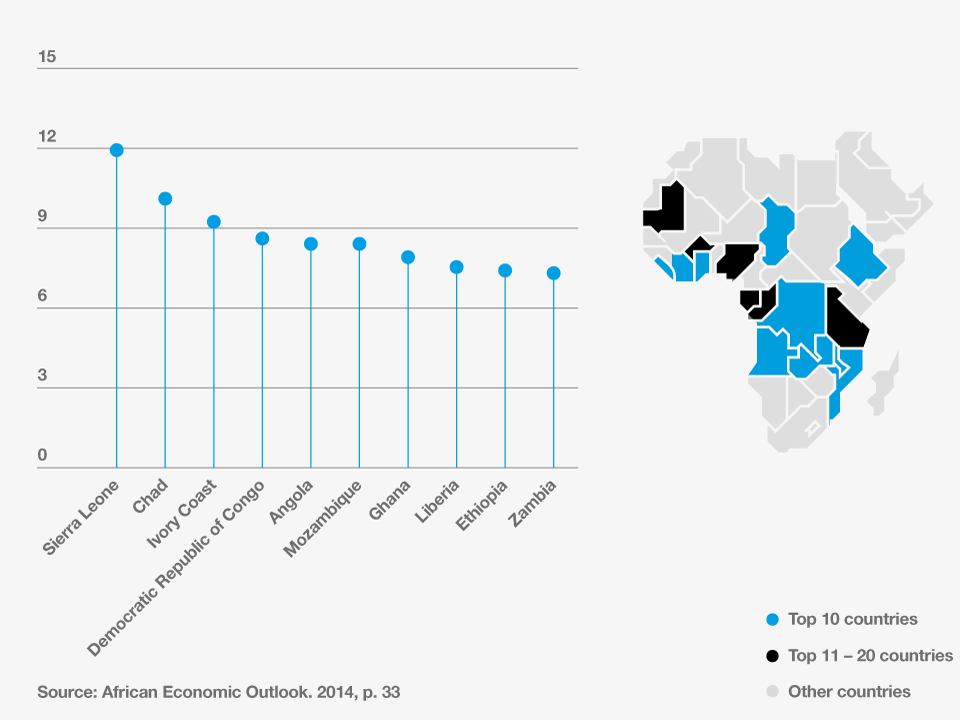BDI Strategy Sub-Saharan Africa
Despite existing challenges, the BDI sees a huge amount of untapped potential in Africa. With its new strategy, the BDI is actively engaging with the German government’s Africa policy and highlighting where and how action must be taken to foster an attractive and sustainable investment climate. The goal is to create conditions that will benefit both the people of Africa and German industry. For the first time, the BDI has not just formulated policy proposals, but has also set up its own catalogue of activities for strengthening German business in Africa. Through its own work and as part of the Sub-Saharan Africa Initiative of German Business (SAFRI), the BDI is drawing attention to the opportunities available to German industry. It advocates the interests of German industry to decision makers in Germany and Africa, and offers constructive recommendations. German industry will intensify its regular discourse with policymakers on Sub-Saharan Africa and actively seek communication with political foundations and civil society on this topic. Following the successful completion of its association partnership project with the Association of Ghana Industries in spring 2015, the BDI launched another such project in April 2015 with the East African Business Council (EABC).
The BDI’s survey on the business activities of German firms in Sub-Saharan Africa showed that, although some German firms are already capitalising on Africa’s potential, their activities on the continent could be expanded further. Sub-Saharan Africa’s share of Germany’s total foreign trade stagnated at a low 1.31 percent for 2013. Other countries have been quicker to discover the potential of the African continent as a sales and investment market. China, for example, wants to increase its trade volume from the present 200 million US dollars to 400 million US dollars by 2020. And at the first US-Africa Business Forum in August 2014, President Obama announced investment commitments totalling 33 billion US dollars to come from private enterprises and the government.
In addition to the interest in securing raw materials for domestic markets, the international capital markets also have a growing interest in Africa. Here, the growing entrepreneurial interest reflects the economic potential of the continent. Many countries in Sub-Saharan Africa are enjoying increasing political and social stability. The region’s economic growth averaged four percent in 2013, compared to global economic growth of three percent. Africa’s medium-term growth prospects are just as promising. Today, six of the world’s fastest growing economies are nations on the African continent. The African Development Bank forecasts average economic growth of five percent for 2014 and up to six percent for 2015, with the highest growth rate of over six percent expected to be seen in East and West Africa. This places these regions among the fastest growing economies in the world.
Key topics of the “BDI Strategy Sub-Saharan Africa: Africa – Continent of Opportunities”
What does German industry expects the countries of Sub-Saharan Africa to do?
- Improve their economic policy environment
- Advance regional integration
- Boost the integration of African markets into the global economy through Economic Partnership Agreements
- Promote vocational training
- Improve infrastructure
What does German industry expects the federal government to do?
- Create synergies between development cooperation and the promotion of foreign trade
- Continue to develop the mechanisms of Germany’s federal export credit guarantees (“Hermes cover”)
- Use raw materials responsibly as a tool for economic development
- Press ahead with investment promotion and protection agreements (IFV)
- Strengthen chamber networks and chamber and association partnerships
- Expand the group of partner countries for double taxation agreements
- Simplify visa policy for African business travellers to Germany
- Focus delegation visits to Africa more clearly
BDI activities in Sub-Saharan Africa:
- Identifying opportunities in East and West Africa
- Intensifying regular exchanges with policymakers
- Communicating the potential of Sub-Saharan Africa and strengthening networks
- Aligning foreign trade instruments to the requirements of German businesses
- Acting as a partner for development aid

© BDI



